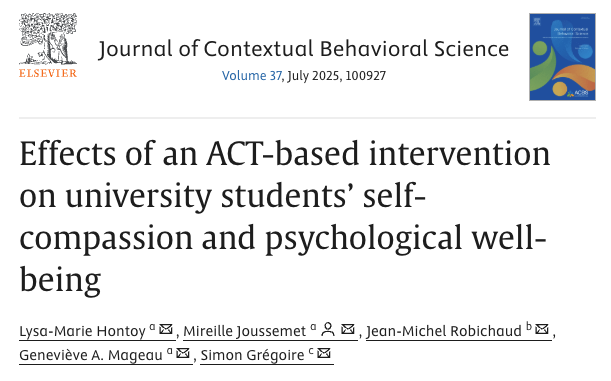Journal of Contextual Behavioral Science (JCBS)
Volume 37, July 2025
Authors
Lysa-Marie Hontoy, Mireille Joussemet, Jean-Michel Robichaud, Geneviève A. Mageau, & Simon Grégoire
Key Findings
- We compared a 5-session ACT workshop designed for university students to waitlist control (Korsa).
- Korsa was efficacious in improving well-being and self-compassion (medium effects).
- Self-compassion may partially mediate Korsa effects on well-being.
- Bridging the self-compassion and ACT frameworks could advance understanding of ACT benefits and mechanisms of change.
Abstract
This study aimed to evaluate the effects of an ACT intervention, Korsa, on university students' self-compassion and psychological well-being. We also explored whether self-compassion could mediate Korsa's well-being benefits. In this randomized controlled trial, 137 university students were randomly assigned to Korsa or a waitlist control condition. Participants completed pre- and post-intervention questionnaires about their self-compassion and well-being (i.e., life satisfaction and presence of meaning). Results showed that compared to students on the waitlist, participants assigned to the Korsa intervention reported higher life satisfaction, meaning, and self-compassion at post-intervention. Exploratory analyses provided preliminary support for the hypothesis that enhancing self-compassion could be a promising mechanism through which Korsa may improve psychological well-being among university students. Bridging the self-compassion and ACT frameworks seems to be a fruitful avenue to advance knowledge about the various ACT benefits and its potential mechanisms of change.
